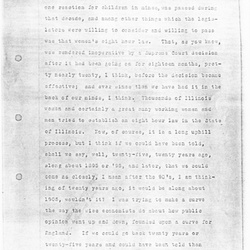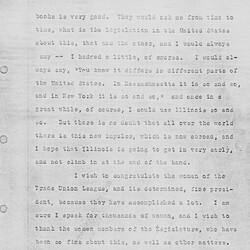MISS JANE [ADDAMS]: I had this engagement to speak in Berwyn before I received this invitation, so I was obliged to tell Miss Nestor I had to speak very early and get away promptly, but I cannot let a meeting like this go away without making the most of it, if I can possibly manage it.
As you know, we once had an eight hour law, in the very early 90's. There was something about those magical 90's that I think of sometimes with very great regret. All over the world from 1880 to 1890, and in the United States in 1890 to 1900 there was a great wave of protective legislation. The child labor legislation all over the world had a great impetus during that twenty years, and the first child labor legislation we ever had in Illinois, except [page 2] one reaction for children in mines, was passed during that decade, and among other things which the legislators were willing to consider and willing to pass was that women’s eight hour law. That, as you know, was rendered inoperative by a Supreme Court decision after it had been going on for eighteen months, pretty nearly twenty, I think, before the decision became effective; and ever since then we have had it in the back of our minds, I think. Thousands of Illinois women and certainly a great many working women and men tried to establish an eight hour law in the State of Illinois. Now, of course, it is a long uphill process, but I think if we could have been told, shall we say, well, twenty-five, twenty years ago, along about 1895 or ’98, and later, that we could come as closely, I mean after the 90’s, I am thinking of twenty years ago, it would be along about 1905, wouldn’t it? I was trying to make a curve the way the wise economists do about how public opinion went up and down, founded upon a curve for England. If we could go back twenty years or twenty-five years and could have been told then that very soon -- twenty years is soon in legislation -- that the bill would be defeated by one, [page 3] only the lack of one vote, [be defeated] by only the lack of one vote, and be turned down by the lack of only half a dozen votes, it would seem to us very encouraging. I think it would have seemed to us that we were on the verge of getting the legislation.
Now, Miss Nestor says that perhaps another bill will be put in with certain concessions. A great many States have made concessions and have gotten their legislation in that way. Other States have not been obliged to make concessions and have gotten the bill, straight as it were. We may be able to. We have tried one way. We may be able to secure it another way, but either way we are very much nearer to it than we have been during the last ten or fifteen years. I am sure the fight, the effort -- I do not like to use the word “fight” exactly. It is out of my vocabulary. But the long effort, the long strenuous endeavor, the unremitting determination to get this legislation has been largely led and sponsored by the Women’s Trade Union League, and never before had we had the help, or so very recently have we had of women in the Legislature and by women in the [page 4] Legislature now, and having a woman who has introduced the bill and befriended the bill through thick and thin. We have every reason to be thankful.
I spoke over radios to high schools over a certain district. Every Friday morning they have to listen to radio talk for half an hour, whether they want to or not, and among other things which I used by way of illustration this morning was the effort they made in Europe for many years, by different nations, to agree on certain types of industrial legislation; two nations finally agreed that no woman should work between the hours of ten at night and six o’clock in the morning. That was long before the United States had any legislation of that sort excepting in a few of our most advanced States.
Well, now, they did it by constant public opinion. The people representing legislative interests, not necessarily industrial legislation, but all sorts of legislative interests represented by the Inter-parliamentary Union, and represented by the Association for Welfare Legislation. The two took up every question and discussed the thing from the point of view of development, the point of [page 5] view of the children, the point of view of all sorts of things, and finally got it through. I suppose in our many states here, which are really more than those twenty-four states in Europe, we will have to go at it and make public opinion in one State after another; and if Illinois could pass that kind of legislation and stick to it, it would have a wonderful aspect, not only on the other States in the Union, but it would have a very heartening effect all over the world, for all over the world there is a certain slump in relation to industry.
I was in Mexico a little while ago, and they have there a straight labor government. They are very proud of their constitution. They are really devoted to that constitution of theirs. It has in it every kind of thing which they have heard of anywhere, which in their opinion makes for the man at the bottom, so to speak, which makes for better social conditions for all the people. They adopted that in 1917, and their legislation with regard to women I do not think is very well enforced, because their factory inspectors are few and far between, but their legislation, the legislation on their [page 6] books is very good. They would ask me from time to time, what is the legislation in the United States about this, that and the other, and I would always say -- I hedged a little, of course. I would always say, “You know it differs in different parts of the United States. In Massachusetts it is so and so, and in New York it is so and so,” and once in a great while, of course, I could use Illinois so and so. But there is no doubt that all over the world there is this new impulse, which is now abroad, and I hope that Illinois is going to get in very early, and not climb in at the end of the band.
I wish to congratulate the women of the Trade Union League, and its determined, fine president, because they have accomplished a lot. I am sure I speak for thousands of women, and I wish to thank the women members of the Legislature, who have been so fine about this, as well as other matters.
























Comments